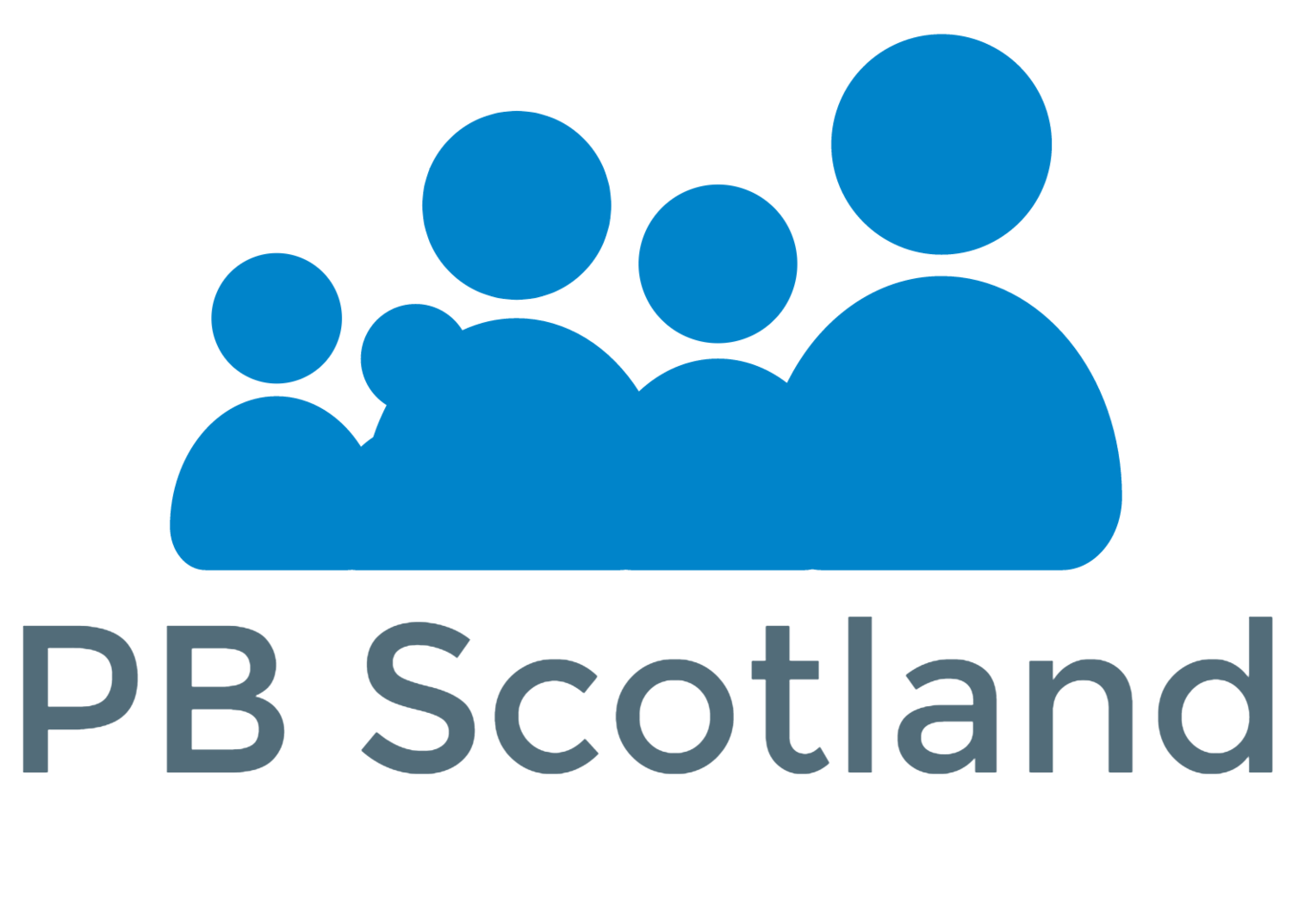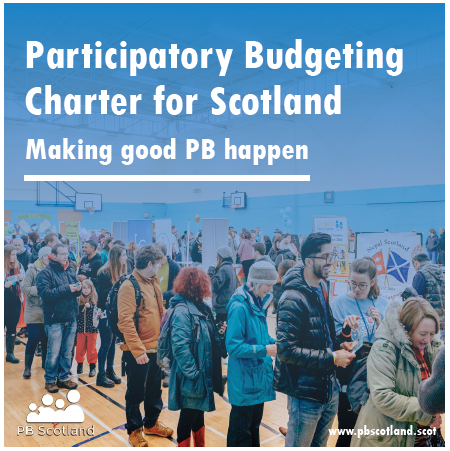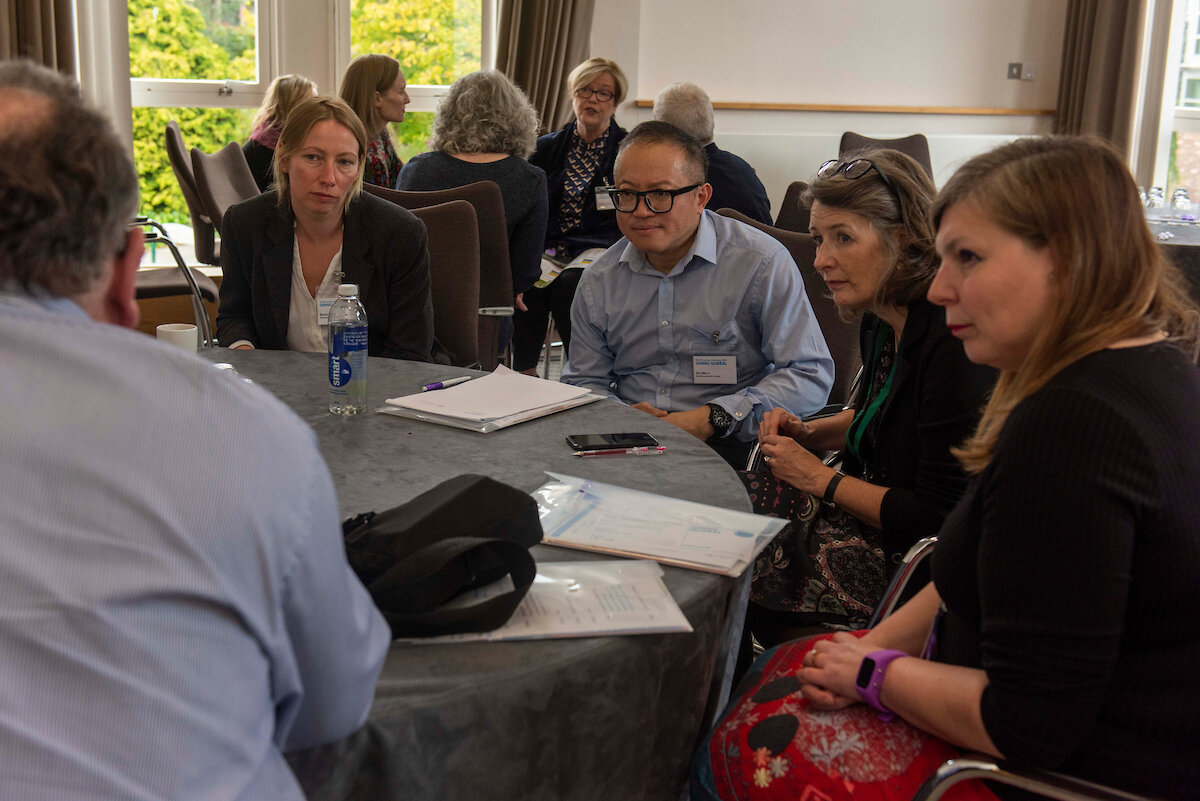Event report: PB Scotland Conference 2019 - Going Global
/Our 4th major conference explored how participatory budgeting (PB) is taking hold across the globe and here in Scotland.
This conference brought together more than 170 people involved in PB in Scotland to share and learn about each other’s practice, to help improve our impact and prioritise future plans.
We had a chance to explore insights into PB activities and approaches from across the world and ask how we can use that learning to build on the range of PB activity across Scotland.
Speakers
Martin Johnstone, Church of Scotland – Chair
Guiding us through the day was our Chair from the Church of Scotland - he kept us to time and reflected on all of the great contributions we heard from our speakers, attendees and workshops throughout the day.
Participatory Budgeting is part of the way we can get ourselves out of a mess, by putting power back into the hands of people and asking them to decide. Martin first learned of PB 20 years ago and his job is to help bring together wisdom from 170 people, from Scotland and around the world.
Cit Lennox, SWAMP Glasgow, Scotland
Cit Lennox is a Youth Worker for SWAMP based in Pollok, Glasgow. SWAMP is a community development trust that uses creative arts to give young people an alternative route in life and to empower social change.
When young people in Pollok were told that they can have responsibility for designing how £200,000 is spent as part of a Glasgow City Council demonstrator scheme, their first reaction was ‘huh? What’s the catch?’. But young people are capable and have the right to make decisions. It’s just that no one had asked us before.
In Pollok, 20 young people came together to form a citizen’s panel, which has since become a youth engagement forum. These young people are ordinary people, doing extraordinary things.
See an interview with Cit here. Read about Pollok’s PB process here.
Josh Lerner, Participatory Budgeting Project, New York City, USA
Josh is co-founder and Co-Executive Director of the Participatory Budgeting Project (PBP), and director of the new Global PB Hub.
PBP has supported, 534,000 people in 30 cities have directly decided how to spend $337,000,000. This work has been recognized by the Obama White House as a model for open government, and by the Brown Democracy Medal as the best practical innovation advancing democracy around the world.
Josh delivered a wonderfully provocative presentation, asking us, what counts as PB. This is a political decision that really matters because what we decide counts as PB matters. During the Regan presidency, due to budget cuts, vegetables were removed from school dinners but reclassified tomato sauce as a vegetable. We can’t risk mislabelling budget consultations or engagement as Participatory Budgeting. Consultations without decision making is not PB because we don’t get to decide.
“What matters about PB is real power, not asking people what they think, but letting them decide. People know when they don’t have real power.”
Paul Johnston - Director-General Education, Communities and Justice Scotland
Paul Johnston is one of the most senior members of the Scottish Government, as Director-General for Education, Communities and Justice. Paul’s focus is on improving education and public services, with a particular focus on children, young people and the wellbeing of communities.
Paul was encouraged by the energy, numbers and scope of people at the conference and delighted to hear Scotland being described as the engine of for PB in the UK. Paul commended the PB Charter for Scotland as a key pillar for PB in Scotland.
Why does the Scottish Government support PB? Scotland’s National Performance Framework describes why we are engaged in public services, that includes tackling poverty by sharing opportunities, wealth and power more equally. For Paul, PB is one key way to do this.
International panel
After workshops we were treated to an international panel discussion where Oliver Escobar posed questions to panellists from across three continents. Questions like:
What created space for PB in your country?
If PB was the solution, what was the problem?
What is the key learning from your experiences with PB?
What advice do you have for Scotland?
Daniely Votto, DVotto Consultoria para Cidades, Porto Alegre, Brazil
Daniely worked for over 5 years as Urban Governance Manager at WRI Brasil, a non-profit organization that implements environmentally, socially and financially sustainable urban solutions to improve people’s quality of life in cities, Daniely also worked as the International Relations Officer for Porto Alegre Municipality for over 3 years, including on international networking for PB. Daniely develops sustainable urban projects for cities in partnership with National and International Governments, Organizations and Private Sector, focusing in open government, gender, and urban mobility.
Daniely drew thunderous applause with her advice to the conference “don’t take democracy for granted”.
Giovanni Allegretti Coimbra University, Centre for Social Studies
Portugal. Giovanni coordinates the PhD “Democracy in the XXI Century”, and published books and articles on participatory planning and budgeting, dealing with issues related to participatory systems, insurgent citizenship and platform economy. As a consultant, evaluator and trainer for the ideation and management of participatory processes, he has been working in more than 40 countries for the World Bank, the Council of Europe, United Cities and Local Governments, the German Cooperation Agency, the Italian Ministry of Foreign Affairs and the Swedish Association of local Authorities.
Giovanni’s key advice was to “never underestimate the importance of transparency and sharing of meaning data”.
John Maritim - Elgeyo Marakwet County Government Kenya
Having served for more than a decade in the public sector as an Economist, John is the Director of Economic Planning and Budgeting and the Open Government Partnership for Elgeyo Marakwet County.
John is responsible for economic planning, budget management processes and coordinates the institutionalization of emerging practices such as participatory budgeting on behalf of the county government.
John’s key piece of advice was to keep working hard on PB, “if we are truly sharing power then there will be push-back, but PB is worth it.
Afternoon panel
A final panel of practitioners shared their reflections on our learning and asked about where next for PB in Scotland?
Claire McPherson - Deputy Director for Public Bodies and Public Service Reform
Claire McPherson is the Scottish Government’s Deputy Director for Public Bodies and Public Service Reform with responsibility for Community Empowerment, Community Planning Partnerships and the Local Governance Review.
Claire loved the energy around PB in Scotland and called on us not to view the world through a lens of scarcity and risk, rather than hope and opportunity. The Scottish Government, Claire concluded, see the opportunity in PB.
Fiona Garven, SCDC
Fiona has been involved in the development of PB in Scotland through her role on the PB Working Group and the establishment of PB Scotland in 2015. With over 1,000 members, PB Scotland is a learning network for community members and practitioners looking to share their experiences of PB from across Scotland.
Fiona reflected on some the critical questions that had been posed throughout the day and spoke about the importance of co-producing PB processes with communities, especially as PB becomes mainstreamed by local authorities. She also referenced the PB Charter for Scotland which acts as a good practice guide to ensure PB is inclusive, uses good quality methods and is truly participative.
Councillor Jennifer Layden Glasgow, Scotland
Jen is a Glasgow City Councillor and City Convener for Equalities and Human Rights – a role that includes community empowerment.
Jen is rightfully proudly of Glasgow City Council’s strong commitment to embedding PB across the City and investment in a deliberative form of mainstream PB targeting areas of greatest deprivation. An evaluation report detailing this work is available here. Jen spoke about the future as including a need to support elected members like her toward a culture change where they are facilitators in communities.
Tressa Burke, Glasgow Disability Alliance Glasgow, Scotland
Tressa advised us of the importance of sharing power through PB and the need to pay particular attention to the need to provide sometimes intensive support that allows the voices of disabled people to be heard.
Tressa agreed that we shouldn’t take democracy for granted, adding that neither should we take participation for granted.
You can read more about GDA’s work here.
Workshops
We had 9 morning and afternoon workshops bringing together fantastic people with experiences and ideas from PB in Scotland and across the globe.
Mainstreaming PB in Scottish Local Authorities
As we work towards the 2021 Mainstream PB Framework Agreement, we heard examples of how local authorities are ‘doing things differently, discussed what mainstream PB can look like in Scotland and the opportunities that PB can provide for local authorities to establish a new relationship with communities.
What we learned from this workshop
We explored the role that local authorities have in delivering mainstream PB across Scotland. We asked what mainstream PB will look like, how will it differ from ‘first generation’ PB, and how will it adapt and fit across Scotland’s 32 local authorities?
We heard from three local authorities, Stirling, Fife and North Ayrshire about how they've approached PB in their communities, and how they’re stepping up their work to meet the 1% 2021 commitment.
Facilitated by: COSLA
Young people and PB
What we learned from the workshop
To be fair and inclusive, PB needs to think carefully about how to best involve young people. Similarly, PB with young people should be designed with inclusion in mind. See the PB Charter’s Fair and inclusive principle for more.
Young people and young people’s organisations have blazed a trail for vibrant community-led PB processes across Scotland. Facilitated by Young Scot with help from Moray Council, this workshop focused on what works and what lessons can be learned by the community at large. Discussion mainly covered how PB with young people involves all young people. Participants agreed that, to be fair and inclusive, PB needs to think carefully about how to best involve young people. Similarly, PB with young people should be designed with inclusion in mind.
Facilitated by: Young Scot
Co-producing good PB with communities
How do we make good quality PB happen in Scotland? Can we use the PB Charter for Scotland and Homeless Network Scotland’s toolkit to support PB work with rather than to communities?
What we learned from the workshop
About the PB Charter:
The Charter is a useful tool to guide good practice and ensure that the core principles of PB are in place.
The PB Charter is a vital tool to ensure the sustainable development of high quality PB across Scotland.
From Gorbals Ideas Fund:
A PB process’s themes, parameters and purpose should come from the ground up, by communities having a central role in designing a PB process, from the start.
Within small grants, individuals should be able to submit ideas for funding, not just constituted groups.
We need investment in the capacity of local organisations to support and deliver PB.
From Homeless Network Scotland:
Community should make decisions on how PB processes and voting should happen.
We need to demonstrate the impact of PB in schools, involving all school community members, pupils, families and teachers.
If PB is about sharing power, how will local authorities respond to ‘surprising’ decisions made through their mainstream PB processes.
Facilitated by: SCDC
Building Dialogue and Deliberation
Good quality dialogue and deliberation is a key feature helping people taking part in PB to come to the best decisions for their communities. Evelyn O’Donnell and Roisin Daly shared the story of how their practice in Glasgow City and Aberdeenshire Council have developed, while Oliver Escobar spoke on what needs to happen to spread our practice?
What we learned from the workshop
Dialogue is important, talk without action may be called toothless but action without talk is mindless.
Building dialogue and deliberation is about increasing the quality of the conversations within a PB process. We should bring people together in dialogue, deliberate and then vote because better conversations lead to better decisions.
A more deliberative democracy supports public decisions based on evidence, conversations and reasoning rather than decisions that are based on power and money.
Participants deliberated on how we can contribute to greater deliberation within our practice and prioritised:
The need for fantastic facilitators, in every community, and from the community as well as working for the community.
Valuing and supporting lived experience is equally as a source of evidence
An intentional approach, making time to plan, organize and resource to build in dialogue and deliberation.
Naming power imbalances, addressing it to build a welcoming space.
Being positive about what is great in a community, what assets exist and build trusting relationships.
Facilitated by: Oliver Escobar
Let’s Get Digital
Digital tools offer additional and complimentary routes toward participation in PB processes, this workshop shared experiences of how this can best works in practice, opportunities for digital participation and challenges to be overcome.
What we learned from the workshop
We heard from 4 different examples of the use of digital in PB and the key takeaway from each was the importance of getting the process rights before focusing on a specific digital tool. Speakers and attendees all had different stories software work well or, more often, not yet fitting their needs.
There was also some interesting discussions balancing digital and in-person engagements, with the trade offs between the value of face-to-face discussions and community-building to the scale and accessibility of online voting methods.
Facilitated by: The Democratic Society
What place for voting?
A discussion on the debate around the proper role of voting within Scottish PB processes. Featuring provocations from COSLA, Participatory Budgeting Project, PB Scotland
What we learned from the workshop
Discussions were wide ranging, from a view that a vote is not required in every process to the view that if there isn’t a vote, it isn’t PB. Discussions ranged from the importance of combining mini-publics with PB processes, and supporting dialogue and deliberation before and after a community vote.
We discussed additional routes to share power were discussed including co-producing PB process with communities.
Facilitated by: The Democratic Society
Tackling inequalities & PB
Tackling inequalities is a key aim of participatory budgeting in Scotland. Often, intersectional inequalities experienced by disabled people, people of colour and others is overlooked. This session explored ways to guard against exacerbating injustice and use PB to help challenge inequality.
What we learned from the workshop
We need to ensure that PB is not just a majority game. We need to make sure that minority voices are heard and people are involved. Flexibility and adjustment as its important to make an extra efforts and try our best to include the whole community. This doesn’t happen by accident, we can’t take participation for granted.
Facilitated by: Glasgow Disability Alliance
Learning from evaluation
What do evaluations of PB in Scotland tell us about practice, policy and impact? Facilitated by Glasgow Caledonian University with a contribution from Glasgow Centre for Population Health, this workshop explored what evaluation work has been carried out and what lessons we can take away – and apply to our work.
What we learned from this workshop
To be transformational, PB has to ensure that communities shape the process from the start. An additional important outcome of community-led PB is that it builds the capacity of communities to hold larger agency-led PB to account. An evaluation of Glasgow’s PB process was highlighted, showing benefits of PB focusing on tackling inequality, and done with the community.






















